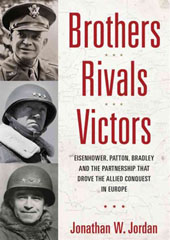
Jonathan W. Jordan’s new book—Brothers, Rivals, Victors: Eisenhower, Patton, Bradley, and the Partnership That Drove the Allied Conquest in Europe (NAL Caliber, $28.95)—offers an account of how George Patton and Dwight Eisenhower struck up a friendship while posted after World War I to Camp Meade, Maryland. The two men were depressed by the war’s end and a peace that promised little glory and days of idleness. But as this excerpt shows, they raised their spirits with talk of a new, exciting kind of warfare.
* * *
As flavorless as life had become for the two young officers, within weeks of their first meeting they managed to rekindle a fire in each other, a fire based on evolving military theory. What bound the two unlikely friends together, they discovered, was a veneration of the tank, the steel horse they conceived to be the saber’s slicing edge on the modern battlefield. As Ike summed up their early relationship, “From the beginning [George] and I got along famously….Both of us were students of current military doctrine. Part of our passion was our belief in tanks—a belief derided at times by others.” Army doctrine, based on the prevailing practice in Europe, held that a tank’s job was to support the infantry by providing cover, smashing through barbed wire and directing close fire support. A tank need not go much faster than five miles an hour, since its function was tied to the foot soldier who crouched, ducked, and stumbled through no man’s land. The two young officers envisioned a new, independent role for tanks in which they would be free to drive deep into the enemy’s rear areas.
It was only a theoretical pursuit, and the two men’s fervor would remain academic until the next big war erupted—if it ever did. But in a peacetime army, the two tankers relished their role as the young, up-and-coming intellectuals. Unpersuaded by the Wilsonian crowd that war was a relic of man’s unenlightened past, they spent their evenings on porches and around heating stoves debating how tanks might create breakthroughs in imaginary battles, spinning hypotheticals and arguing solutions late into the night.





